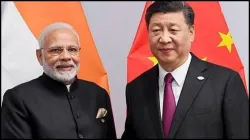China's military says border dispute with India a 'legacy issue', doesn't represent bilateral ties
Chinese Ministry of National Defence spokesperson Senior Colonel Wu Qian blamed India for violating consensus and making unilateral provocations and stressed that both countries are in constant touch. India-China relations remain frozen for over three years following the Galwan Valley clash in 2020.

Beijing: China's military on Thursday said the border issue with India was a "legacy issue" and it would be "unwise" to link the border issue with the overall bilateral relations between the two countries as the dispute does not represent the entire picture of ties. The statement comes as India-China relations remain frozen since May 2020 after the Galwan border clash near the Line of Actual Control (LAC).
Chinese Ministry of National Defence spokesperson Senior Colonel Wu Qian responded at a media briefing in Beijing in response to a question on External Affairs Minister S Jaishankar's reported statement that China violated the bilateral consensus in 2020 and assembled a large number of military forces along the Line of Actual Control (LAC), resulting in the conflict in the Galwan Valley.
Wu reiterated China's claim that the Galwan Valley lies on the Chinese side of the western sector along the LAC and blamed India for violating the consensus and made unilateral provocations. "Therefore, the responsibility entirely lies with the Indian side," he said.
Wu added in the past three years, China and India have maintained communication and coordination through military and diplomatic channels. "The border dispute is a legacy with India but that does not represent the whole picture of the bilateral relations. Therefore, it is unwise and inappropriate for the Indian side to link the border issue with the overall relations. It goes against the shared interests of the two countries," he stressed.
"We hope the Indian side can work with the Chinese side to enhance strategic mutual trust, properly handle differences and safeguard peace and tranquility in the border areas," Wu further remarked, saying that information on the next India-China Corps Commander Level meeting will be released soon.
India-China border disputes
India is pressing the People's Liberation Army (PLA) of China to disengage from the Depsand and Demchok areas. While India has maintained that there cannot be restoration of normalcy in its relations with China as long as the state of the borders remains abnormal, China continues to press India to delink the border issue and bilateral relations and work for normalcy.
The two militaries held 20 rounds of Corps Commanders level meetings and agreed to disengage from four points mainly the Galwan Valley, the Pangong lake, Hot Springs and Jianan Daban (Gogra) contributing to the de-escalating tension along the border, according to Wu. However, the meetings have so fear
A Pentagon report released last year shows that China has increased the deployment of forces and continued infrastructure build-up, including underground storage facilities near Doklam, a second bridge over Pangong Lake and a dual-purpose airport and multiple helipads, along the LAC in 2022 amid border tensions with India.
"Differing perceptions between India and the People's Republic of China (PRC) regarding border demarcations along the Line of Actual Control (LAC) combined with recent infrastructure construction on both sides, led to multiple clashes, an ongoing standoff, and military buildups along the shared border," the report released by the US Department of Defence this month said.
"China also deployed as many as three light-to-medium CABs in the eastern sector from other theatre commands and an additional three CABs in the central sector of the LAC. Although some elements of a light CAB eventually withdrew, a majority of the deployed forces remain in place along the LAC," it added.
Galwan clash in 2020
In response to a skirmish in June 2020 between Chinese and Indian patrols in Galwan Valley, the most violent clash between the two countries in 45 years, the Western Theater Command implemented a large-scale mobilisation and deployment of People's Liberation Army (PLA) forces along the LAC, the report said.
The Galwan Valley clashes on June 15, 2020 significantly strained the bilateral ties. The Western Theater Command’s deployments along the LAC will likely continue through 2023, it said. The report said that negotiations between India and China "made minimal progress as both sides resisted losing perceived advantages on the border". India has maintained that its ties with China cannot be normal unless there is peace in the border areas.
The report also says China has more than 500 operational nuclear warheads and will probably have over 1,000 by 2030.
(with PTI inputs)
